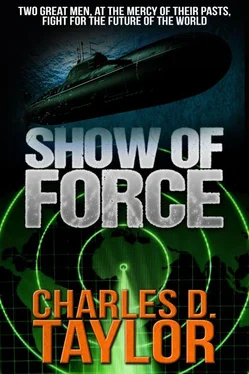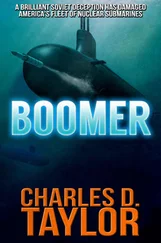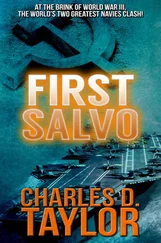But first, he would call Admiral Collier back. He could not let the Americans buy any more time. He would show Collier the newest photos of Islas Piedras, proof that the Russians knew there was little left for the United States to bluff with. And he would control his temper this time. His explosive reaction had had little effect on the obviously cool American naval officer.
Bob Collier was surprised when Gorenko called, requesting him to return to the Kremlin for further discussion. The Russian had spoken to him directly, preferring not to leave the phone call to an aide. To Collier that meant only one thing. Gorenko was disturbed by the direct contact with Washington. Even with conclusive proof, perhaps Gorenko had just the slightest doubt that he was missing something from the earlier photos, or from his intelligence network. Lack of trust was a Russian weakness, and Collier wasn't about to let on that their intelligence was superb.
Again the black car was waiting by the embassy door for him. This time, on the assurance of the Soviet Admiral that the ambassador needn't come, Simpson remained with his staff, agreeing that now one of them should always be within the building. The crowd outside was larger than before, and uglier. He had to assume that other American embassies in other foreign cities were experiencing the same problems by this time. Possible nuclear confrontation frightened people of any nationality, frightened them enough to exhibit violence. And the world had to be aware now of the great battle being fought in the Indian Ocean. With the merchant shipping in that sector, fantastic reports of sea battles must be filtering back from the neutral ships escaping from the immediate area.
His reception within the walls was no different than earlier that day, but his greeting by Gorenko was decidedly changed.
"I must thank you for returning so soon after your last visit, Admiral Collier," beamed the other man, extending his hand in a too-confident manner. "It is an inconvenience, I am sure, but then we have a problem that is not easily solved by avoiding each other."
"Thank you, sir," Collier replied, taking a chair offered to him with a grand sweep of the hand. "Anything we can do to reach a meeting of the minds is certainly of prime importance."
Gorenko touched a button on his desk and almost instantly the door opened from the operations room to admit an aide pushing a cart containing a large, highly polished samovar. "Tea, Admiral?"
"Thank you."
The aide served the tea in magnificently engraved glasses bearing the Admiral's seal. There was delicious black bread, the mainstay of the Russian diet, a meal in itself, that was offered by the aide, with another smile and a take-one-please gesture from Gorenko. When the service was complete, the aide left, never having uttered a word nor having received a command from his Admiral.
The tea was strong and black, as Bob Collier expected it would be. It and the bread reminded him he had hardly eaten since dinner the previous day. There was little conversation for the first few moments, only pleasantries between two strong individuals sizing each other up after the earlier meeting.
Gorenko hoped the guard around the embassy was doing its job satisfactorily.
Yes, they seemed to be.
Was the crowd being held back far enough?
Yes, they would prefer they weren't there, but there seemed 10 be little inconvenience to the American marine guard.
It was hoped the Russian armed guard could be dismissed soon.
Yes, Collier was sure they all felt that way. Too many niceties, Collier decided, but he'd play the game. The bread was excellent, he remarked, and he was disappointed the cooks at the embassy couldn't bake that way.
Gorenko would have some sent over.
"I'm sure," continued Gorenko, "we might enjoy tea together again sometime, or even a stronger drink, for I have no doubt we could find a great deal to talk about of mutual interest. Right now, we both have many brave sailors dying far away from their homelands. It is unfair to our nations that this tragedy should take place. However, I must place the blame at your country's feet. It is you who have attempted to establish a military presence where you are not wanted."
"Perhaps I could correct you somewhat, Admiral Gorenko. You have made the first move as a result of your Chairman's speech. We Americans may not be wanted right at this instant, but you are incorrect in your usage of the word 'attempted.' We have established this military presence on Islas Piedras, but it is for the protection of peace in this sphere and not for aggressive purposes. We will shortly assure all nations at the U.N. of this fact."
Gorenko smiled as he shook his head in mock sadness. "You should be the ambassador here for your persuasive manner and, of course, your diplomatic approach. Also, you are unlike many of your naval officers. However," and he reached into a desk drawer to pull out, then spill, a number of photographs on the desk top, "I have evidence that precludes your statement. These pictures tell much now." He stood. "Perhaps you have never seen this Islas Piedras of yours as clearly before, as if you were reading a travel brochure."
Collier stood to get a better look of the photos. "I've never had the pleasure."
"This is what it looked like when it was peaceful and undisturbed and" — he looked directly at Collier, the earlier smile gone, the eyebrows raised—"this is what it looks like now." He dropped one of the new photos he had been holding in his hand next to the first one. "I'm sure you see the difference."
"I don't deny it." He returned the icy stare. "We never have."
"Let me put them in perspective for you." The photographs were again each numbered in the upper right corner, and Collier noted the well-scheduled shots of the island through its development, both from a high scale showing the island expanse, and then closer to show individual launching sites. The older photos were often of poor quality, which was probably the reason the Russians hadn't caught on earlier.
They both stood there, on opposite sides of the otherwise clear desk, examining the pictures, Gorenko saying nothing, waiting for Collier to force the discussion. The photo considered most recent showed a close-up of a launch site that any expert would feel was incomplete, regardless of a lack of familiarity with the equipment itself. Collier sat back down.
"I assume you find these pictures of your Islas Piedras of interest?" Gorenko sat in his high chair, his head resting against the back, returning the other's stare. "Let's not fool each other, Admiral. I don't know what kind of missiles you are installing, and I don't particularly care whether you call them Wolverine or whatever. And I don't have to, because the launchers that are installed are not only not ready to fire, but I see no evidence of missiles of any kind, nor have we observed any ships delivering such a cargo."
"I think it should be quite obvious that our intentions were not to lay everything out for your cameras. Your intelligence gathering is as good as ours… almost," Collier added, "but we certainly were not performing for your satellites or your spy planes." He stopped for a minute to fold his arms. "You determine quite correctly that you are not familiar with that particular installation, and I imagine that may be the major reason your experts have told you that Islas Piedras is not complete. Admittedly, you almost caught us off guard, but not quite."
"How so?" It was a direct, disbelieving question, delivered with utmost confidence by Gorenko.
"As you have also obviously perceived, the majority of this system is underground. Only the sensing devices and certain guidance equipment are in plain view. Perhaps our experts in Washington were trying to make you think we were building a navigation or weather station." Gorenko blinked, but said nothing, seeing no humor in the previous statement. "I think we've done an excellent job of camouflaging the entire thing, so well that we were able to confuse your intelligence people."
Читать дальше












